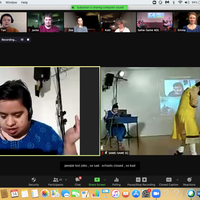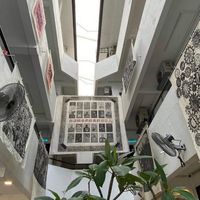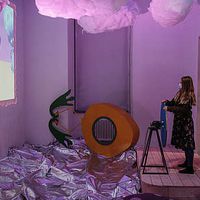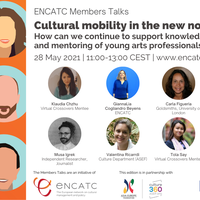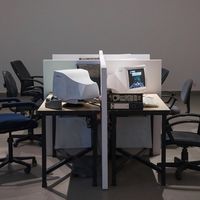"How are the arts adapting to the New Normal"? | A Reading Room in Guangzhou

Last December, culture360 launched a new series of articles on how the arts are adapting to the "New Normal". One year into the global pandemic, this series will present experiences and stories of resilience, adaptation, and success from the arts sector to the Covid-19 pandemic, with particular focus on differently disabled artists and arts organisations, artists residencies and arts funding.
A library, a study room, and a hangout spot, Reading Room is a public space where friends gather to read, discuss, meditate and imagine. Launched by HB Station in Guangzhou, China during the pandemic, it is an offline project that aims to connect with friends through the medium of publications.
Huangbian Station Contemporary Art Research Center (‘HB Station’) is a non-profit art institution founded in 2012 in Guangzhou, China. Conceived as an educational platform by two founding artists, Huang Xiaopeng and Xu Tan, HB Station has experimented with various methods of ‘research-practice’, to explore contemporary scenarios and promote knowledge exchange in a local and trans-local context.
During the COVID-19 pandemic, HB Station has suspended or postponed a series of activities, including exhibitions and its residency programme. Instead of rushing to launch online programmes, HB Station has undertaken to continue to host offline projects with improvised practices.

Inside the Reading Room. Photo by Zhu Jianlin. Courtesy of HB Station.
Reading Room is one of these offline projects. With ‘publications as method’, the aim of the project is to contextualise HB Station’s practice within a broader framework through collecting and cataloguing zines, brochures, documents, books and archives, either self-produced or donated by friends in our network in mainland China, Hong Kong, Japan, Indonesia and other parts of the world. It also serves the purpose of education through the medium of publications.
Preparation in the Pandemic
The inspiration for Reading Room came from many friends in our network, including Asia Art Archive in Hong Kong and the Reading Room in Bangkok. We were particularly impressed by the latter’s small but well-organized collection of books (not necessarily related to contemporary art) that prompt visitors to linger. Furthermore, after eight years of running, HB Station had built up an archive of its own that needed to be tidied up and categorised.
The preparation for Reading Room started as early as in September 2019, when we found a lovely and airy apartment located in an old and hidden residential building in central Guangzhou. The launch was nevertheless delayed from the first half of 2020 to late October due to the COVID-19 outbreak.
Back in February 2020, the fear for this then little known virus and the sweeping lockdown affected everyone in the country. No one knew exactly how serious the situation was and how long it would last. No one could foresee that it would later change the world. In a time of great uncertainty, we didn’t desire to make a rapid response, but rather to slow down. All of a sudden, we appeared to have a bit of extra time, and reading became a consoling exercise. Hence, although some other projects were curtailed, preparation for the Reading Room continued.
Luckily, the preparation did not cost much. All it took was an effort to reach out. The collecting of materials for the Reading Room turned out to be a particularly good opportunity to connect with old and new friends during these difficult times. Although we can easily connect with each other via instant messages, material goods still have to be sent with often prolonged if not totally disrupted postal service. The waiting and the joy in receiving packages made the connection all the more worthwhile.
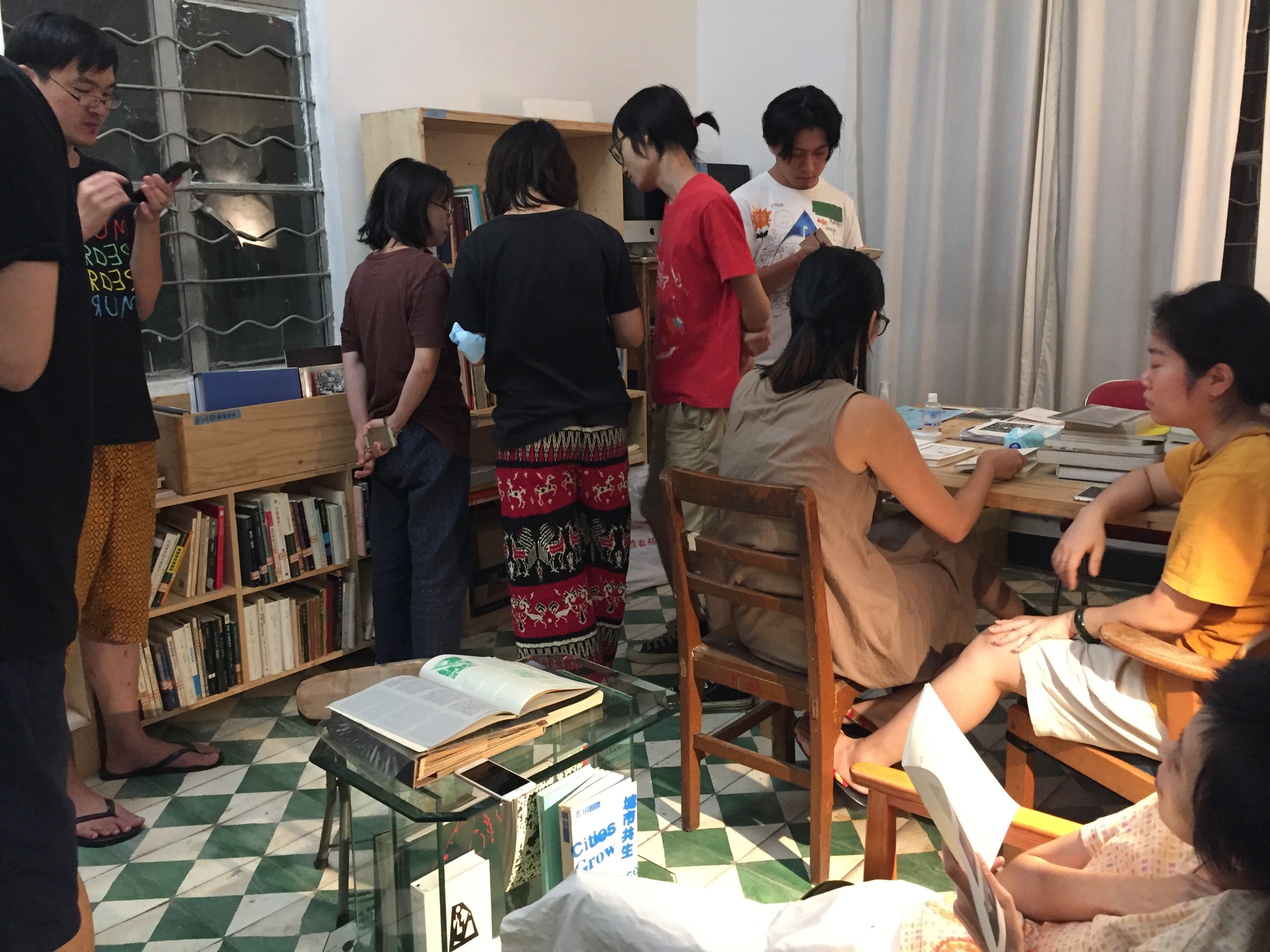
A late night visit to the Reading Room. Photo by Li Xiaotian. Courtesy of HB Station.
After almost a year of preparation, Reading Room opened to the public in October 2020, on an appointment-only basis. Nevertheless local friends can always find their way here. Once a group of friends came at night and stayed until late. We also used resources in the Reading Room as references for working with artist Chen Jialu in producing her publication. We plan to host more informal workshops to utilise the materials and space of Reading Room in the future.
New Practices Beyond the Space
Reading Room endeavours to generate new methods of ‘research-practice’ through actively making publications, to which HB Station has been long committed and which readily relates to HB Station’s other on-going projects.
The first publication to be made is a bilingual brochure based on research for Singapore Travel Agency, a project originally planned for the summer of 2020 that has been shifted online due to travel restrictions. Since June, we have set up an online chat group with Singaporean artist friends Zou Zhao, Ho Rui An, Ho Tzu Nyen and curator friend Kenneth Tay. We have been sharing thoughts and discussing matters of mutual concern ever since. At first, we weren’t very clear what to do, given that we were quite reluctant to stage even more Zoom meetings, which were exhausting. After two casual online hangouts, we found that what is more important is the willingness to understand and support each other in such unusual times and to experiment how to work together without definitive plans or pressure from deadlines. The idea we came up with is to collectively script some narratives on Singaporean history, politics and everyday events with the recycling of our chat history in the past few months as ‘archive’ of the precious time we spent together online.
Last but not Least

Team of HB Station at the Reading Room. From left to right: Feng Junhua, Zhu Jianlin, Liang Jianhua, Xu Tan and Li Xiaotian. Photo by Wan Qing. Courtesy of HB Station.
In unprecedented times such as the one we are living in, art projects need to adapt and be flexible, while a ‘classic’ one like a Reading Room works just as well. In our experience, Reading Room is a research-driven and relatively low-maintenance project to carry out, but ultimately it is the people, our network of friends that make it work. Such a project is a luxury in an age of endless online programmes, while it is also meant to be a simple and accessible concept. After witnessing lockdowns in different cities and countries, we believe that reading and connecting with friends, near or far, in a slow-paced, mutually-caring and non-instrumental manner are the best healing experience.
Further Reading
- ‘ART SPACE PROFILE :: HB STATION 黄边站 in Guangzhou’, China Residencies, 11 Apr 2020, https://www.chinaresidencies.com/news/293.
- ‘CPA 2019 系列讲座回顾 III 梁健华:“虚时而行”讲座回顾’, Rockbund Art Museum, 21 February 2020, https://mp.weixin.qq.com/s/gU01dk7AXvgSbVMskkuCBQ. [in Chinese]
- ‘HB STATION: A Case Study of Alternative Art Education in China’, Asia Art Archive in America, 10 Jul 2014, https://www.aaa-a.org/programs/hb-station-a-case-study-of-alternative-art-education-in-china/.
Di Liu is a researcher and writer based in Hong Kong and the United Kingdom. She has worked with HB Station on Southeast Asia-related projects since 2017. Currently she is pursuing a PhD at the University of Cambridge.
Similar content
posted on
21 Jan 2021
from - to
28 May 2021 - 28 May 2021
14 Jan 2021

